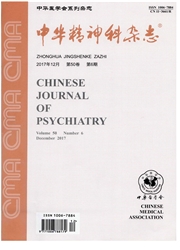

 中文摘要:
中文摘要:
目的探讨抑郁症患者治疗前及6个月后缓解者的认知功能特征。方法采用24项汉密尔顿抑郁量表(24-Items Hamilton Depression Scale,HAMD24)对103例抑郁症患者(抑郁症组)和与之相匹配的104名健康对照者(健康对照组)评定抑郁严重程度。采用WSCT及神经认知功能评估工具中的Stroop色词测验、连线测验、词语流畅性测验、韦氏记忆量表评定抑郁症患者帕罗西汀治疗前及6个月后抑郁症缓解期患者(抑郁症缓解组)的认知功能特点及变化。采用方差分析和简单效应分析比较抑郁症缓解组和与之相匹配的健康对照随访者(对照随访组)认知因子变化差异。结果基线时,抑郁症组信息处理速度、词语流畅性、认知灵活性、学习记忆等方面各因子评分均显著低于健康对照组(t=-7.441--4.601,P〈0.01)。抑郁症缓解组(n=53)与对照随访组(n=31)各认知因子经两因素重复测量方差分析,词语流畅性[基线:(-0.81±0.93)分与(-0.13±1.12)分;6个月:(-0.38±0.87)分与(0.08±0.94)分]组别×时间无交互作用(F=0.625,P=0.432),组间差异有统计学意义(F=7.672,P=0.007),但时间点差异无统计学意义(F=1.484,P=0.227);其余认知因子组别×时间均存在交互作用(P〈0.05或P〈0.01);简单效应分析显示,基线时2组间认知因子比较差异均有统计学意义(P〈0.05或P〈0.01),但6个月时2组间差异均无统计学意义。结论抑郁症发病期患者存在认知功能损害,除词语流畅性外,其他认知因子在抑郁症缓解期恢复至健康水平,词语流畅性可能是抑郁症的内表型,而其他认知因子可能为抑郁症的状态型。
 英文摘要:
英文摘要:
Objective To explore the cognitive function characteristics in major depressive disorder (MDD) before and after 6-month treatment. Methods Assessed the severity of depression with 24-hem Hamihon Depression Rating Scale (HAMD24), 103 MDD were matched with 104 healthy controls (HCs). Both groups of the subjects were measured cognitive function with WSCT and neurocognitive assessments package, including the Stroop Color Word Test, the Trail Making Test, the Verbal Fluency Test and the Wechsler Memory Scale, before and after 6 months of paroxetine treatment. ANOVA and simple effect analysis were used to compare the differences in cognitive factors between the groups. Results At baseline, the verbal fluency, processing speed, cognitive flexibility, learning and memory in MDD patients were significantly worse than that in the HCs (t=-7.441- -4.601, P〈0.01). Analyzed by a two-way repeated measures ANOVA, the verbal fluency in remitted MDD (n=53) was still significantly worse than follow-up HCs (n=31; -0.38±0.87 vs. 0.08±0.94; F=7.672, P=0.007), however there were no significant interaction of groupXtime (F=0.625 ,P=0.432), or any significant difference between two groups at different time (F=1.484, P=0.227). While all other cognitive factors had significant interactions of groupXtime (P〈0.05 or P〈0.01). Analyzed by the simple effect analysis, all other cognitive factors were significantly worse in MDD at baseline (P〈0.05 or P〈0.01 )but no significant difference between two groups at the end of the six-month follow-up. Conclusion MDD exhibits impairment in cognitive function before effective treatment. The verbal fluency may serve as potential cognitive endophenotypes that will not be changed after the treatment, while the other cognitive factors may serve as state types which are possibly able to restore after the treatment.
 同期刊论文项目
同期刊论文项目
 同项目期刊论文
同项目期刊论文
 White matter integrity alterations in young healthy adults reporting childhood trauma: A diffusion t
White matter integrity alterations in young healthy adults reporting childhood trauma: A diffusion t Reduced Cingulate Gyrus Volume Associated with Enhanced Cortisol Awakening Response in Young Healthy
Reduced Cingulate Gyrus Volume Associated with Enhanced Cortisol Awakening Response in Young Healthy Elevated specific peripheral cytokines found in major depressive disorder with childhood trauma expo
Elevated specific peripheral cytokines found in major depressive disorder with childhood trauma expo Altered regional homogeneity in post-traumatic stress disorder: a restingstate functional magnetic r
Altered regional homogeneity in post-traumatic stress disorder: a restingstate functional magnetic r Elevated specific peripheral cytokines found in major depressive disorder patients with childhood tr
Elevated specific peripheral cytokines found in major depressive disorder patients with childhood tr Repetitive transcranial magnetic stimulation as an augmentative strategy for treatment-resistant dep
Repetitive transcranial magnetic stimulation as an augmentative strategy for treatment-resistant dep Grey matter volume abnormalities in patients with bipolar I depressive disorder and unipolar depress
Grey matter volume abnormalities in patients with bipolar I depressive disorder and unipolar depress Abnormalities in whole-brain functional connectivity observed in treatment-naive post-traumatic stre
Abnormalities in whole-brain functional connectivity observed in treatment-naive post-traumatic stre Abnormalities of cortical-limic-cerebellar white matter networks may contribute to treatment-resista
Abnormalities of cortical-limic-cerebellar white matter networks may contribute to treatment-resista Abnormalities in whole brain functional connectivity observed in treatment-naive post traumatic stre
Abnormalities in whole brain functional connectivity observed in treatment-naive post traumatic stre Posttraumatic stress disorder among female victims of sexual assault in China: prevalence and psycho
Posttraumatic stress disorder among female victims of sexual assault in China: prevalence and psycho A comparative study of theoretical graph models for characterizing structural networks of human brai
A comparative study of theoretical graph models for characterizing structural networks of human brai 期刊信息
期刊信息
